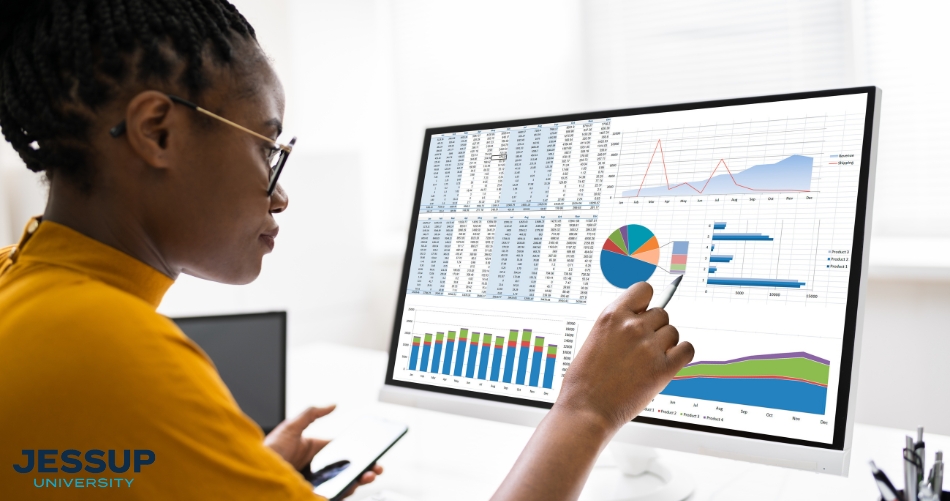
Essential Skills to Become a Successful Data Analyst
Data analytics is one of the fastest growing fields today. With an increasing number of companies realizing the importance of data-driven decision making, the demand for skilled data analysts continues to grow rapidly. So what does it take to stand out and build a successful career in this competitive field? Mastering both technical expertise as well as soft skills is key.
An Overview of Data Analyst Roles and Responsibilities
A data analyst is responsible for collecting, cleaning and organizing large data sets, and analyzing them to uncover actionable insights that can drive business strategy and decisions.
Some typical data analyst roles and responsibilities include:
- Retrieving data from multiple sources, including databases and software systems
- Data cleaning and preparation – identifying incomplete, incorrect, inaccurate or irrelevant parts of the data
- Conducting quantitative and qualitative data analysis using statistical methods and programming languages like SQL, Python and R
- Applying modeling techniques like machine learning algorithms to data in order to uncover patterns and predictive insights
- Visualizing data findings using data visualization tools like Tableau, Power BI and Excel
- Communicating data-driven insights and recommendations clearly to stakeholders through reports and presentations
In summary, a data analyst serves as the bridge between raw data and important business decisions by deriving value from data.
Want To Learn Computer Science From Home?
Jessup University’s Unique Online BS in Computer Science Can Make It Happen!
Must-Have Data Analyst Skills
While statistics, communication and problem-solving abilities are crucial, every aspiring data analyst needs to build up a robust set of technical qualifications.
SQL
SQL (Structured Query Language) is a standard programming language used for managing and analyzing data stored in relational databases. Whether you’re extracting specific data points, identifying relationships between data sets or updating existing data, SQL querying is an indispensable aspect of a data analyst’s day-to-day work. Fluency in SQL also enables effective collaboration with database administrators and data engineers.
Some common SQL skills needed include:
- Writing SELECT statements to retrieve relevant data
- Filtering large data sets with WHERE clauses
- Using aggregate functions like COUNT, SUM, MAX and AVG
- Joining data from multiple related database tables
- Modifying database structures and contents with DDL and DML
SQL querying forms the initial stage of the data analysis process for most data analysts. Mastering this skill is therefore the first step to becoming an expert analyst.
Statistical Programming Languages
While spreadsheet programs like Excel allow you to work with small, single data sheets, statistical programming languages like Python, R and MATLAB provide the firepower for complex quantitative analysis on larger datasets.
Python and R in particular have become ubiquitous in data science and analytics. Learning at least one of them is indispensable for aspiring data analysts. Here’s an overview:
Python
Python is a versatile, beginner-friendly and general-purpose programming language, equipped with specialized libraries and frameworks tailored for machine learning, predictive modeling, data visualization and statistical analysis. Key reasons data analysts should learn Python:
- Open-source, with rich documentation and active community support
- Easy to read and write, enabling faster development
- Integrates seamlessly with Big Data tech like Apache Spark and Hadoop
- Packed with data-focused libraries like NumPy, SciPy, Pandas, Matplotlib and Seaborn
R
Developed specifically for statistical analysis and graphics, R provides an extensive collection of packages and functionalities for advanced analytics. Some notable R features:
- Specialized data structures and data manipulation capabilities
- Inbuilt statistical and graphical capabilities
- Highly extensible with over 17,000 libraries for niche tasks
- Dominates statistical modeling and machine learning applications
- Integrates with Python, SQL and other Big Data tools
Whichever route you take, developing proficiency in using Python or R will dramatically boost your capabilities as a data analyst or data scientist.
Data Visualization
While number crunching and coding form the backbone of data analysis, visualizing data findings is equally important – especially when presenting insights to business teams and stakeholders.
Data analysts rely on data visualization software like Tableau, Power BI, Qlik and D3.js to create interactive dashboards, charts, graphs and other graphics that bring data analysis to life.
Some useful data visualization skills include:
- Transforming raw datasets into formats like charts, graphs and maps
- Conveying relationships between variables through scatter plots and heat maps
- Comparing categorical data visually using pie, donut and bar charts
- Highlighting chronological patterns over time using line graphs
- Simplifying complex numerical figures via reports and summaries
Data presentation is where data analysts can truly provide intelligence and value to an organization. Strong data visualization skills enable you to communicate insights far more effectively to drive business strategy.

The Human Element: Crucial Soft Skills
While programming proficiency and statistical modeling are imperative for extracting insights from data, soft skills determine how you apply and communicate those insights to enable decision making.
Here are the most important soft skills that can set data analysts apart:
Strong Analytical and Critical Thinking
Data analysts tackle open-ended business problems through critical thinking frameworks. This involves:
- Framing an ambiguous question through structured thinking
- Gathering reliable data and selecting appropriate analytical methodologies
- Making connections in data to test hypotheses and identify issues
- Drawing insightful conclusions while questioning assumptions
- Communicating inferences from analyses clearly
- Managing stress when tasked with huge datasets
Sharp critical thinking and analytical abilities allow data analysts to solve problems creatively to drive impact.
Communication Skills
Even the most sophisticated analysis holds little value if the findings cannot be translated into actionable recommendations.
Excellent communication skills enable data analysts to:
- Present data insights effectively to senior executives and domain experts using reports and visualizations
- Storytelling – Building engaging narratives to provide context, clearly explain the significance of findings and convince stakeholders
- Use visual and written mediums to outline next steps and strategic direction
- Address queries and feedback through follow-up discussions
In short, conveying technical analyses persuasively is fundamental for data-driven decision making.
Business Acumen
Understanding overarching business objectives is crucial when attempting to derive value from data. Business acumen allows data analysts to:
- Grasp the underlying business model, industry landscape and competitive pressures
- Identify relevant KPIs aligned to key objectives during analysis
- Provide contextual recommendations tailored to end goals
- Quantify potential business impact through data to justify decisions
- Continuously create additional value and enable innovation
Solid business knowledge amplifies both the effectiveness and buy-in for proposed data solutions.
Continuous Learning Mindset
Given the rapid pace of evolution in data technologies, resting on your laurels is never an option.
A growth mindset focused on continuous skill improvement is vital for sustainable success, and involves:
- Actively learning emerging technologies like artificial intelligence (AI) through online platforms
- Experimenting with real-world tools via side projects
- Participating in online data communities to engage with industry experts
- Networking with mentors to learn industry best practices
- Undertaking certified vocational training programs frequently
Commitment to lifelong training guarantees that analysts remain innovators rather than bystanders.

Expanding Your Data Analytics Toolkit
While mastering SQL, Python, statistical modeling and visualization represents a well-rounded foundation of essential data analyst skills, specializing in certain domains can boost employability further:
Machine Learning and AI
Machine learning infuses predictive power into data analysis, an extremely valuable capability today. Having strong ML chops allows data analysts and scientists to uncover hidden insights at scale for business advantage. This domain covers:
- Supervised algorithms like regression, SVM and random forests
- Unsupervised learning methods including clustering and dimensionality reduction
- Deep learning techniques like CNNs, RNNs and LSTMs
- Model validation, optimization and deployment
- AI governance practices for transparency and fairness
Big Data Engineering
As data complexity rises exponentially, using distributed big data tools provide the computing muscle and storage for next-gen analysis. Big data skills for data analysts include:
- Managing data processing workflows with Apache Spark
- Building cloud-based data data lakes on AWS, Azure and GCP
- Streamlining ad hoc analysis through data warehousing practices
- Establishing scalable data pipelines and architectures
- MLOps – Model deployment, monitoring and governance
Advanced Analytics and BI
Going beyond basic analysis, advanced BI encompasses more sophisticated techniques tailored to business needs:
- Data mining algorithms for pattern recognition and sense-making
- Complex statistical analysis for variance reduction and causation
- Time series forecasting using ARIMA and GARCH for long-term modeling
- Predictive analytics to estimate future outcomes and trends
- Prescriptive analytics to recommend optimal business decisions
Specialized analytical competencies magnify the business influence of data analysts significantly.
Want To Learn Computer Science From Home?
Jessup University’s Unique Online BS in Computer Science Can Make It Happen!
How to Become a Data Analyst
Are you eager to jump into a career in data analytics? Jessup University’s Bachelor of Science in Computer Science presents an in-depth program fusing theoretical foundations with practical application. With on-campus or online learning options, students can choose their preferred format to excel.
Flexible Learning Modes for Aspiring Data Analysts
Students have the flexibility to choose between on-campus and online learning modes. Those attending in person gain from direct interactions with faculty, collaborative opportunities with peers, and engaging in various campus events structured over 15-week semesters.
Conversely, online learners benefit from the convenience of flexibly accessing course materials and faculty support over accelerated 7-week terms.
Data Analysis Focus in Curriculum
Central to both learning paths is a focus on the critical elements of data analysis. The curriculum is designed to foster a deep understanding of the data analysis process, combining specialized courses, practical projects, and a strong emphasis on ethical considerations.
Core Competencies for Newly Skilled Data Analysts
What is computer science? It’s the field of study that focuses on computation, information, and automation using computers and computational systems. It’s the backbone and foundation behind data analytics and can lead you in many directions within the tech space.
The program ensures that graduates are well-equipped with a broad range of skills relevant to data analytics. Through required and elective courses, Jessup University’s CS curriculum equips graduates with well-rounded proficiency spanning:
- Fluency in Python, R, and SQL for manipulating, analyzing, and visualizing data
- Statistical modeling, simulation, forecasting, and experimental design techniques
- Database architecture, warehousing, and large-scale distributed systems
- Supervised, unsupervised, and reinforcement machine learning algorithms
- Dashboard, report, and presentation development skills
- Integrating concepts of software engineering and computer programming with creative design
Nurturing Hard and Soft Skills in a Collaborative Environment
With an emphasis on small class sizes, Jessup University promotes a close-knit learning community where students develop both hard technical skills and soft skills, such as communication and teamwork, through real-world applications.
Preparing Ethically-Minded Data Analysts
The program equips students with technical skills and instills moral values grounded in Christian principles. This approach ensures the cultivation of responsible, professionally prepared graduates ready to embark on their career path in data analytics.
Let’s Get Started on Your Data Analytics Adventure at Jessup University
Jessup University’s Bachelor of Science in Computer Science is an ideal stepping stone for those wanting a career as a data analyst, offering a balanced mix of theoretical knowledge, practical skills, ethical grounding, and flexible learning options.
The world needs talented data analysts who understand our data-centered reality. Are you ready to fulfill this challenging yet gratifying role? If so, reach out for more information now; you could be on your way to a new, rewarding career!
More Engineering & Technology Articles
-

Software Engineer Career Outlook: 2024 and Beyond
What is software engineering? Software engineering is the computer science area that applies engineering principles to design, develop, test, deploy, and maintain software applications and systems. The…
-

What is Information Technology? Uncovering The Pathway To An IT Career
What Types of Careers Are Available in Information Technology, What Is the Earning Potential of Information Technology Careers, What Expertise Is Required for a Career…
-

What Is Computer Science? A Beginner’s Guide to the Field That’s Shaping Our World
What Types of Careers Are Available With a Computer Science Degree, What Does a Computer Scientist Do on a Daily Basis, How Much Could You…
